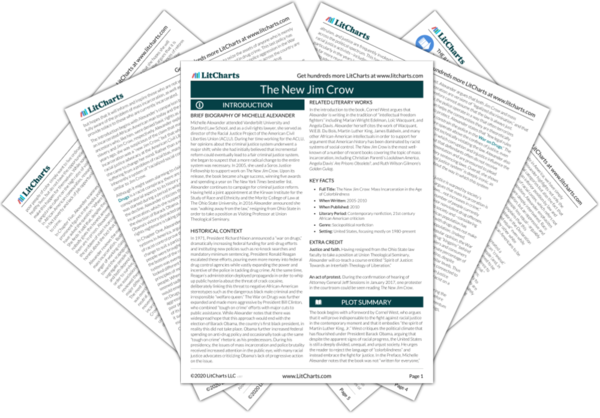Justice vs. the Law
The book emphasizes that although Jim Crow laws were legal (and indeed an intrinsic part of the Southern legal system), they were also deeply unjust. Alexander argues that both Jim Crow and mass incarceration are versions of “legalized discrimination,” and that we therefore cannot assume that the law is always just. Similarly, the police operate in a way that often terrorizes rather than helps the communities they are theoretically supposed to protect. Alexander states that…
read analysis of Justice vs. the LawThe Illusion of Progress
Throughout the book, Alexander argues against the commonly-held view that there has been significant progress in racial equality since the Jim Crow era. She particularly focuses on the significance of Barack Obama’s presidency, which many people take as evidence that America has entered a “post-racial” era in which racism is no longer a powerful barrier to people of color achieving success. However, Alexander argues that there is “no inconsistency” between the election of Obama…
read analysis of The Illusion of ProgressRacial Castes, Stereotypes, and Hierarchies
One of the book’s central arguments is that “we have not ended racial caste in America; we have simply redesigned it.” By “caste,” Alexander highlights not only the grouping of people into racial categories but also the fact that certain races are “locked into an inferior position by law and custom.” By using the language of racial castes, which refers not only to skin color but also class position, Alexander emphasizes the way in which…
read analysis of Racial Castes, Stereotypes, and Hierarchies
Violence, Surveillance, and Social Control
The New Jim Crow aims to radically reverse the reader’s understanding of the relationship between the criminal justice system and violence. Whereas we are usually taught to believe that prisons and police keep people safe from violence, Alexander argues that prisons and police are in fact tools through which the state inflicts violence on people in order to control them. While she concedes that many people find it absurd that society could be safer and…
read analysis of Violence, Surveillance, and Social ControlMyth, Dishonesty, and Conspiracy
In the introduction to the book, Alexander admits that when she first encountered the argument that mass incarceration was a continuation of slavery and Jim Crow, it sounded like a conspiracy theory that would hinder rather than help the fight for racial justice. However, in the ten years following that first encounter, her opinion shifted drastically. The book shows that the phenomenon of mass incarceration is indeed something of a white supremacist conspiracy. The myths…
read analysis of Myth, Dishonesty, and Conspiracy






